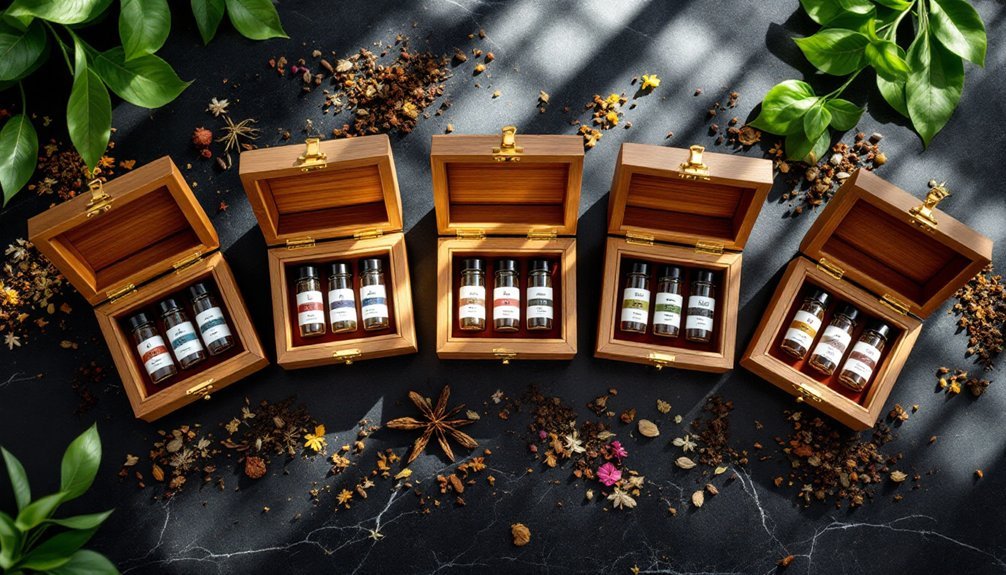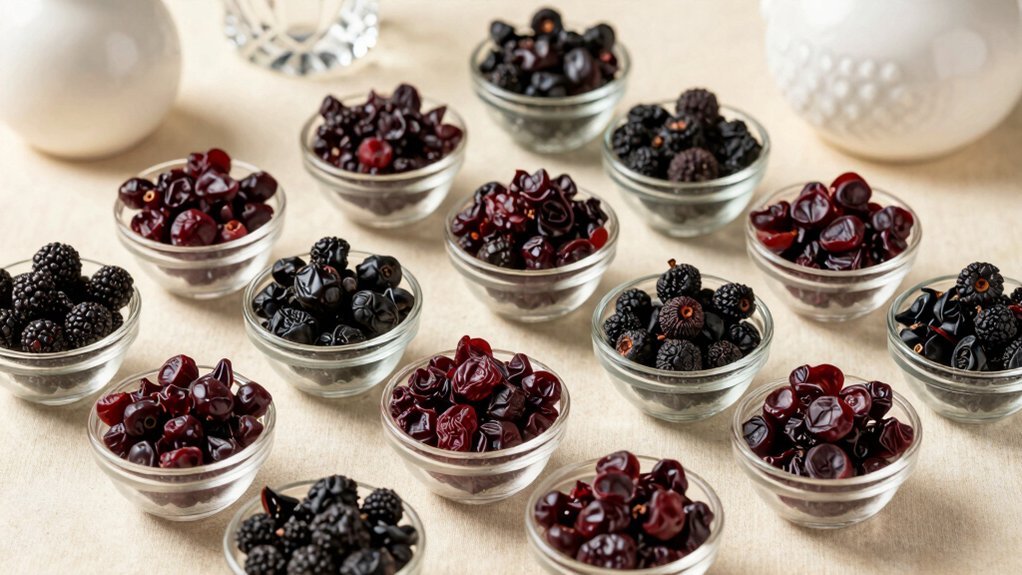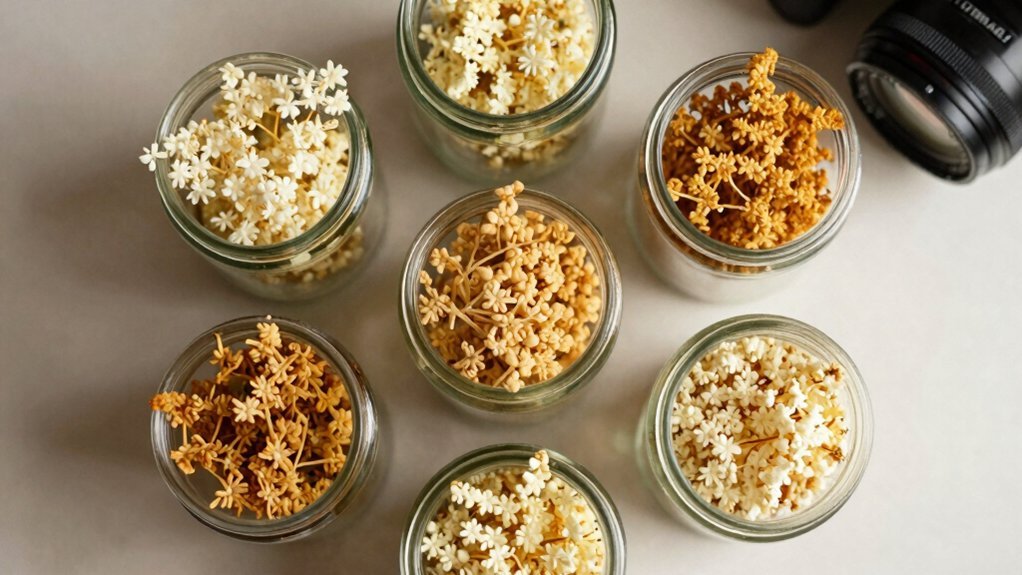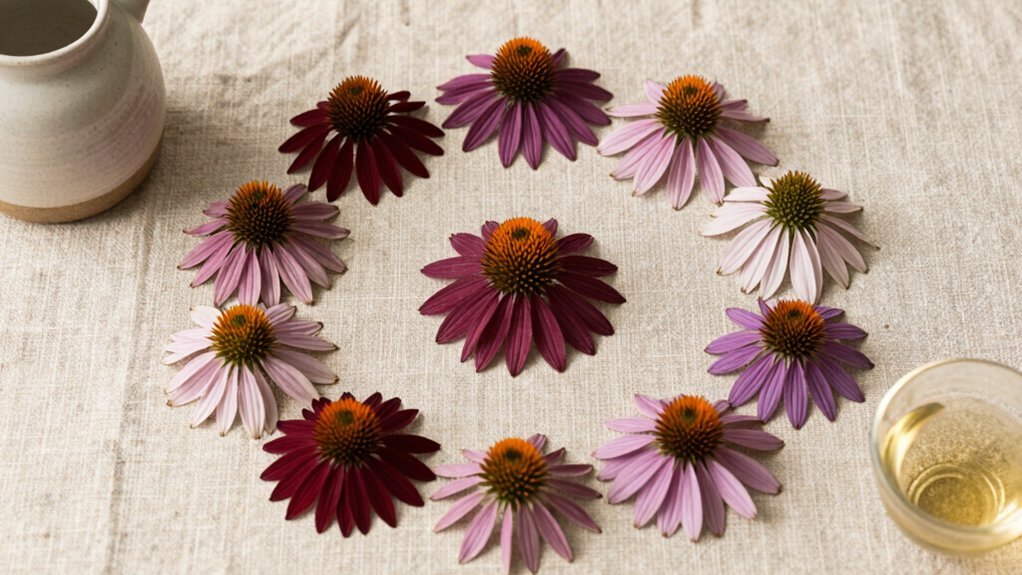If you're serious about becoming a tea connoisseur, you'll need to train your nose to identify the subtle nuances that distinguish exceptional teas. A quality aroma training kit can transform your casual tea drinking into a refined sensory experience. While many kits claim to offer authentic tea scents, only a select few deliver the precision and thorough training needed to develop a professional-grade palate. Let's explore the top options that'll elevate your expertise in 2025.
MOXĒ Smell Training Kit with 4 Essential Oils for Smell Recovery
Smell recovery patients seeking a structured approach to regain their olfactory senses will find the MOXĒ Smell Training Kit invaluable. Made in the USA, this kit features four essential oils – lemon, rose, clove, and eucalyptus – specifically chosen to stimulate damaged neural pathways.
You'll get a progress tracking guide and individual inhalers containing pure essential oils. While some users note the scents could be stronger, the kit's design enables close contact with your nose during training sessions. Results vary, with improvements possible after a week and a half of consistent use. If you're recovering from COVID-19 or other smell-affecting conditions, this scientifically-backed training system offers a promising path to recovery.
Best For: People recovering from smell loss or distortion due to COVID-19, viral infections, or other conditions who want a structured, science-based approach to olfactory rehabilitation.
Pros:
- Complete kit with scientifically-selected essential oils representing key scents from the Odor Prism
- Includes progress tracking guide and personal log for monitoring improvement
- Convenient inhaler design allows for direct nose contact during training sessions
Cons:
- Some users report scent intensity could be stronger
- Results vary significantly between individuals and may take considerable time
- May need to supplement with stronger essential oils for optimal training
TASTERPLACE Aroma Set Red Wine for Sommeliers
Training your palate as a wine enthusiast or aspiring sommelier is effortless with the TASTERPLACE Aroma Set Red Wine. This all-encompassing kit features 12 distinct red wine aromas plus a bonus scent, accompanied by an informative booklet and QR-coded food pairing guide.
You'll appreciate the elegant design and modern aesthetics, making it an excellent gift choice. While some users reported issues with certain scents, the manufacturer's responsive customer service quickly addresses concerns like leaking vials. The kit's affordability and educational value have made it a favorite among sommelier schools. Whether you're studying professionally or exploring wine tasting as a hobby, you'll find this kit both entertaining and instructive.
Best For: Wine enthusiasts, aspiring sommeliers, and anyone looking to develop their wine-tasting skills through a structured, educational approach.
Pros:
- Comprehensive kit with 12 aromas plus bonus scent, complete with educational materials and QR-coded food pairing guide
- Excellent value for money with professional-grade training materials used by sommelier schools
- Elegant packaging and design make it an attractive gift option
Cons:
- Some users report unpleasant odors from the box
- Quality of certain aromas may not meet expectations
- Occasional issues with leaking vials, though customer service is responsive in addressing problems
Plant Therapy Top 6 USDA Organic Essential Oil Set
For tea enthusiasts seeking a natural approach to aroma training, the Plant Therapy Top 6 USDA Organic Essential Oil Set delivers six pure, high-quality scents that parallel common tea notes. This USDA-certified organic collection includes eucalyptus, lavender, lemon, peppermint, sweet orange, and tea tree oils—each undergoing rigorous testing by expert Robert Tisserand and third-party laboratories.
You'll find these 10 mL bottles ideal for identifying various tea characteristics: citrus notes (lemon, sweet orange), herbal elements (peppermint), floral undertones (lavender), and medicinal qualities (eucalyptus, tea tree). The set's affordability and consistent quality make it a practical choice for developing your tea sensory skills.
Best For: Tea enthusiasts and aromatherapy beginners looking for a high-quality, USDA-certified organic essential oil set to enhance their sensory training and wellness routines.
Pros:
- USDA organic certification ensures pure, chemical-free oils sourced through sustainable practices
- Comprehensive third-party testing and expert validation by Robert Tisserand guarantees quality
- Versatile selection of six popular essential oils suitable for multiple applications at an affordable price point
Cons:
- 10mL bottle size may be too small for frequent users
- Limited to six basic oils, may need additional varieties for more specific needs
- Some users might prefer larger sets with more oil varieties for the price
Smell Training Kit with Essential Oils for Smell Therapy
With four potent essential oils – lemon, eucalyptus, rose, and clove – this extensive smell training kit offers an ideal starting point for tea enthusiasts looking to sharpen their olfactory skills. The kit includes glass vials that preserve aroma integrity and a progress-tracking guide to help you monitor your development.
You'll find the custom-designed smell jars enhance aromatic release, making scent recognition more effective than traditional methods. While some users report significant improvements in their sensory abilities, others suggest buying oils separately might be more cost-effective. The 30-day return guarantee provides peace of mind if you're unsatisfied with the results, though experts advise patience as smell training requires consistent practice.
Best For: Tea enthusiasts and individuals looking to improve their sense of smell through structured olfactory training with high-quality essential oils.
Pros:
- Complete kit with four distinct essential oils in glass vials to maintain aroma integrity
- Includes custom-designed smell jars and progress tracking guide for systematic training
- Backed by a 30-day return guarantee for customer peace of mind
Cons:
- Some users report inconsistent product quality with empty or ineffective jars
- May be more expensive than purchasing essential oils separately
- Results vary significantly between users and require extended practice time
MOXĒ Smell Training Kit with 4 Essential Oils
Smell recovery meets scientific precision in the MOXĒ Training Kit, an ideal choice for tea enthusiasts who've lost their sense of smell due to illness or injury. Made in the USA, this kit features four essential oils: lemon, rose, clove, and eucalyptus, carefully selected to stimulate neural pathways in your nose.
You'll find a personal log and guide to track your progress, while each inhaler contains pure essential oil for authentic scent recognition. While some users note the scents could be stronger, the kit's design allows for close contact during training sessions. Expect gradual improvement with consistent use, though you might want to supplement with additional oils for a more intense experience.
Best For: People seeking to recover their sense of smell after illness (particularly COVID-19), injury, or other conditions causing smell loss or distortion.
Pros:
- Made in USA with scientifically-selected essential oils for olfactory training
- Includes helpful tracking materials (personal log and guide) for monitoring progress
- Convenient design with individual inhalers for close nose contact
Cons:
- Scent intensity may be too weak for some users
- Results vary significantly between individuals and require consistent practice
- May need supplementation with stronger essential oils for optimal training
Factors to Consider When Choosing an Aroma Training Kit for Tea
When you're selecting a tea aroma training kit, you'll want to verify that the essential oils meet quality standards and accurately represent authentic tea scents with appropriate intensity levels. Look for kits that include detailed training guides explaining proper sniffing techniques and scent recognition methods, along with sturdy, well-designed storage to protect the samples. Your ideal kit should also feature progress tracking tools that help you monitor your advancement in identifying different tea aromas over time.
Essential Oil Quality Standards
The quality of essential oils in your tea aroma training kit directly impacts the accuracy and effectiveness of your sensory education. When evaluating kits, you'll want to verify that the oils come from suppliers with USDA organic certification or equivalent standards to guarantee purity and safety.
Look for kits that provide documentation of GC-MS testing results, which confirm the authenticity and composition of each oil. The extraction method matters too – steam distillation and cold pressing are preferred techniques that preserve the oils' natural properties. You should also check that the oils are properly stored in dark glass bottles to maintain their integrity.
Don't forget to examine the botanical names listed on each oil. This detail helps you identify the exact plant species used and prevents confusion between similar scents.
Scent Intensity and Authenticity
Selecting an aroma training kit with proper scent intensity and authenticity can make or break your tea sensory education. You'll want to focus on kits that use pure essential oils with higher concentrations, as these provide stronger, more distinct aromas that'll help you identify tea notes more effectively.
Look for kits that store their oils in high-quality glass vials, which preserve the scents' integrity and prevent deterioration over time. The authenticity of the aromas is vital – your training kit should contain genuine essential oils that accurately represent the natural scents found in different tea varieties. Additionally, choose a kit that includes a structured training approach with progress tracking capabilities. This systematic method will help you build a reliable foundation for recognizing and memorizing various tea aromas as you develop your expertise.
Training Guide Comprehensiveness
Three key aspects define a thorough training guide in any quality tea aroma kit. First, it must provide detailed descriptions of each scent, complete with origins and processing methods that explain how these distinct aromas develop. Second, you'll want clear, step-by-step instructions for proper scent evaluation techniques, including specific inhalation methods and assessment procedures.
Look for guides that incorporate practical learning elements, such as blind testing exercises and aroma matching activities. These hands-on components help you build confidence in identifying different tea scents. The best training guides also include a progress tracking system, letting you document your journey and improvements. This feature isn't just about recording data—it's about maintaining motivation and creating a structured approach to developing your tea aroma expertise.
Kit Storage Design
Beyond thorough training guides, storage design plays a fundamental role in preserving your tea aroma training experience. When selecting a kit, you'll want to look for individual, airtight containers that protect each essential oil from oxidation. Glass vials are your best bet, as they don't react with the oils and maintain scent integrity over time.
The kit's layout should make it easy to locate and identify specific aromas during your training sessions. Look for designs that include well-labeled compartments and a dedicated space for your progress log. If you're planning to practice at different locations, consider a compact, portable option that won't compromise on storage quality. The right storage design won't just protect your investment—it'll enhance your learning experience and help you develop your sensory skills more effectively.
Progress Tracking Features
Progress tracking features transform a simple aroma kit into a thorough learning tool. As you explore tea aromas, you'll want to document your sensory discoveries and improvements in a systematic way. Look for kits that include personal logs or structured guides where you can record your daily experiences with different tea scents.
The best tracking systems offer visual representations of your journey, making it easier to stay motivated and identify patterns in your learning process. Some modern kits integrate digital tools, like companion apps or QR codes, that enhance your training experience with additional resources. When choosing a kit, prioritize those with tracking features that match your learning style. Whether you prefer traditional journaling or digital progress monitoring, these tools will help you develop a more refined tea palate through consistent, documented practice.
Price Vs Value Assessment
A smart investment in tea aroma training starts with understanding how price relates to value. When comparing kits, you'll want to evaluate both the quantity and quality of aromas included. Higher-priced options often deliver superior scent intensity and purer ingredients, making them worth the extra cost for serious enthusiasts.
Consider the educational materials that come with your kit. Those that include extensive guides and training resources offer better overall value. Look for kits with quality assurance features, such as testing certifications or satisfaction guarantees, which can justify premium pricing. Additionally, factor in the kit's longevity – a more expensive option that allows for repeated use and includes a wider variety of aromas may prove more economical in the long run than cheaper alternatives with limited applications.
Scent Variety Range
The range of scents included in your tea aroma training kit directly impacts its effectiveness for developing sensory skills. You'll want to look for kits that offer a diverse selection of aromas spanning floral, fruity, herbal, and earthy notes commonly found in teas.
Choose a kit that features both primary and secondary aromas, as this combination will help you build a more thorough understanding of tea profiles. It's beneficial to select options that include varying intensity levels, from subtle to pronounced scents. This range will sharpen your ability to detect nuanced differences between similar tea varieties.
Consider kits that incorporate both natural and synthetic aromas, as this dual approach provides a more realistic training experience. The broader the scent variety, the more opportunities you'll have to practice and refine your sensory recognition skills.
Professional Certification Requirements
When pursuing professional tea certification, you'll need an aroma training kit that aligns with recognized industry standards and evaluation methods. Look for kits that include thorough documentation tools, such as sensory journals or digital logging systems, to track your progress and build a professional portfolio.
Your chosen kit should feature a structured learning path that covers the essential aroma compounds tested in certification exams. It's vital to select one that includes both common and complex scents you'll encounter during blind tastings. Pay attention to whether the kit follows established sensory evaluation protocols used by certification bodies.
The best kits will support your olfactory training with methodical exercises designed to enhance your scent memory and recognition abilities, preparing you for the rigorous assessment requirements of professional certification programs.
Frequently Asked Questions
How Long Does It Take to Develop a Professional Tea-Tasting Palette?
You'll need 6-12 months of dedicated practice to develop a professional tea-tasting palette. With daily tasting exercises and proper guidance, you can train your senses to identify subtle flavor notes and characteristics.
Can Children Use Tea Aroma Training Kits Safely?
You can let children use tea aroma kits safely under adult supervision. They're non-toxic, but you'll want to monitor young kids to prevent spills and guarantee they don't accidentally ingest concentrated scents.
Will Medications Affect My Ability to Detect Tea Aromas Accurately?
Yes, certain medications can affect your sense of smell and taste. If you're concerned, it's best to consult your doctor before starting aroma training, as some drugs might temporarily alter your sensory perception.
Do Tea Aroma Compounds Degrade Over Time in Training Kits?
Yes, you'll notice tea aroma compounds gradually degrade in training kits. They're sensitive to light, heat, and oxygen exposure. To maintain accuracy, you should replace your kit every 12-18 months with proper storage.
Are There Certification Programs That Incorporate These Tea Aroma Kits?
You'll find tea aroma kits used in several certification programs, including the Tea and Herbal Association's courses, ITEI's tea sommelier program, and the UK Tea Academy's professional training. They're often part of sensory evaluation modules.





Leave a Reply